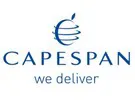Capespan has reached a watershed moment in its drive to integrate and streamline its business to create a single global platform centred on servicing its market customers and grower partners.
The company has recently completed an alignment and restructuring process of its fruit business, which was the culmination of a strategy embarked on two years ago to simplify and re-focus the Capespan business.
“Internal complexity within Capespan has created a fragmented customer strategy”, explained Tonie Fuchs, Capespan managing director. “Capespan’s main objective is to connect our customers at the two opposite ends of the supply chain, namely our grower partners and our market customers, as directly, seamlessly and efficiently as possible.”
“In order to achieve this, we had to radically simplify our business model and build an integrated Capespan culture of service delivery,” explained Fuchs. “A cornerstone of our simplified business model is a focused approach to service selected key market and grower partners with an experienced team that is aligned around our promise of service delivery excellence to them,” according to Fuchs. “We have realised that, if we want to be the best and most reliable supply partner to our customers, we cannot be everything to everyone.”
Fuchs explained that Capespan’s value proposition lies in its ability to supply selected market customers, with a basket of fresh fruits, from multiple source countries, through a single contact point, directly from source. Capespan has invested heavily in technology in order to radically simplify its supply chain, maximise efficiency and significantly reduce costs.
“At the same time we will ensure that, with our global footprint, our grower partners will have the best market access for their products, with sustainable and competitive market returns.” elaborated Fuchs. “Capespan will be the simplest, most efficient and cost effective conduit for the market and growers to work as directly with one another as possible. We have changed our focus from being a volume driven fruit marketer to becoming the service provider of choice to our selected customers.”
Capespan has made significant changes to its commercial and support functions throughout the business globally, in order to align its resources and expertise to implement its new strategy. The main impact of these changes has been in the UK, Europe and South Africa.
“Our business will be built, and our combined resources will be focussed, on servicing our key customers. We want to do that better than any of our competitors,” explained Fuchs. “To achieve this we have streamlined our infrastructure and corporate and management structures in the UK, Europe and South Africa to develop a globally integrated team, aligned behind our common objective of service delivery.
Charl du Bois, who joined the Capespan team in 2016, has been appointed Commercial Executive of the Capespan Fruit business. Du Bois and his executive team will drive the strategic decisions to implement a global citrus, grape and pome fruit commodity focus rather than a regional focus. Inmarket, Capespan’s customers will be serviced by strategically placed market managers for each region who will ensure hands-on service delivery to its core customers.
In Europe, fruit value chains have experienced accelerated change in the last five years. The French market in particular has come under close strategic scrutiny. After a thorough investigation, the Capespan management concluded that Capespan France, which was heavily reliant on the non-core subtropical category, was no longer commercially viable within the simplified business model and the decision was made to close the French office on the Rungis market.
In addition to the structural changes, Capespan is in the process of automating processes to reduce the complexity at the back end of the supply chain and to simplify processes at the front end.
According to Fuchs the Capespan business going forward will have two distinctive focus areas, namely commercial and shared services. “The commercial teams will focus on our promise to our customers while the shared services will focus on enabling the commercial team to deliver on our promise. All non-commercial processes are moved away from the commercial teams to shared services. Globally, shared services will function as one unified integrated team enabling the commercial teams to focus on servicing their grower- and market customers. The shared services solution will be aligned, integrated and automated throughout the business globally,” explained Fuchs.
Capespan will provide its customers with improved service levels through a fully transparent, scalable and cost effective supply chain. “We will provide our customers with a service platform where they are able to transact as directly as possible with each other from both ends of the supply chain,” said Fuchs.
“The refocus and restructuring of the Capespan business on the premise of service delivery excellence and value creation for our customers, combined with the substantial investments into South African and Namibian fruit production, has positioned Capespan perfectly for ongoing sustainable growth and future success”, concluded Fuchs.
 For more information:
For more information:
Tonie Fuchs
Capespan
Email: tonie@cgl.co.za
Charl du Bois (Commercial Executive)
Email: Charl_du_bois@capespan.co.za
